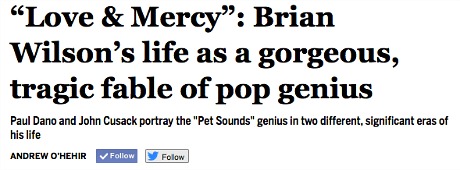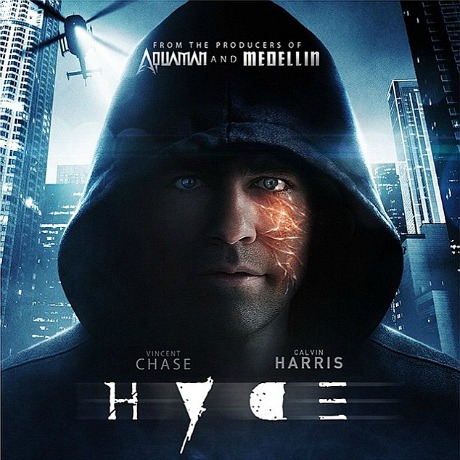Sarah Colt‘s Walt Disney, a four-hour PBS American Experience doc airing on 9.14 and 9.15, will offer a learned study of Walt’s adventure — his landmark achievements in animation, studio-building, TV success (Mickey Mouse Club, the Davy Crockett trilogy) and the creation of Disneyland in 1955. But will it also look at the unflattering stuff in a fair way? Will it address Disney’s alleged anti-Semitic leanings and his distrust of women, as Meryl Streep mentioned in a National Board of Review speech in January 2014? Will it get into the Mary Poppins story and tell stories about Walt’s chain smoking and other personal foibles? Boilerplate: “A polarizing figure, Walt Disney’s achievements are indisputable. He created one of the most beloved cartoon characters in history, conceived the first ever feature-length animated film (i.e, Snow White and the Seven Dwarfs), pioneered the integration of media and marketing with thousands of branded products, invented the anthropomorphic wildlife documentary and conceived Disneyland, the world’s first theme park and the fulfillment of a lifelong desire to create a world unto itself.”
Day: June 5, 2015
It’s A Spielberg Film, All Right
What are the boilerplate signatures of a Steven Spielberg period drama? I don’t know if there’s a list but you can definitely feel the hand of the guy who made Catch Me If You Can and The Terminal (which also starred Tom Hanks), not to mention Lincoln and Munich. There’s a certain feeling of compression and urgency, a sense that the high-stakes political melodrama that actually unfolded in the late ’50s was quite the nail-biting drama of its time. The atmosphere feels pushed, exaggerated. And Spielberg’s “house” dp Janusz Kaminski is back with his deep blacks and milky blue tints. But no John Williams score this time due to surgery — Thomas Newman is filling his shoes.
Bridge of Spies (Disney/Touchstone, 10.16) refers to a famous bridge used by the Americans and Soviets for exchange of captured spies during the Cold War. Spielberg’s film is about the U-2 spy plane incident of May 1960 when CIA surveillance pilot Francis Gary Powers was shot down by the Soviets. Powers was sentenced to ten years in the slam but American lawyer James Donovan (Tom Hanks) eventually negotiated his release.
Dano Kick-Around
Yesterday morning I did a 20-minute phoner with Paul Dano, whose performance as the young Brian Wilson in Love & Mercy is unquestionably one of the year’s greatest performances. I’ve always felt a certain kinship with Dano on the strength of having attended high school in Wilton, Connecticut, but admiration-wise I’ve been on the Dano train since his first big score as the mentally frazzled son in Little Miss Sunshine (’06). The following year he played Paul and Eli Sunday in Paul Thomas Anderson‘s There Will Be Blood, for which he won a BAFTA award for Best Supporting Actor. The next highlight was his brief but striking performance as a cruel plantation overseer in Steve McQueen‘s 12 Years A Slave. But his work in Love & Mercy is the peak — one of those career breakthroughs that actors dream about. His performance will almost certainly be remembered at year’s end.

Paul Dano prior to last Tuesday’s screening of Love & Mercy at the Academy theatre in Beverly Hills.
“Something about Brian’s spirit…there was so much joy in it…obviously a lot of pain and struggle in Brian’s life, but playing such a beautiful and complicated guy,” Dano said. “Always connected to something bigger than himself. I knew the Pet Sounds and Smile sessions so well and I sang and played live in a couple of scenes. It was probably my favorite experience I’ve ever had…a lot of friendly ghosts and spirits in the studio…it was really alive.”
From my Toronto Film Festival review: “Every year there’s a lead performance or two in an indie-level film that’s so drop-to-your-knees mesmerizing that people like myself throw back the shutters and shout ‘make room…this one matters!’ I’m telling you straight and true that Dano‘s performance is almost spookily great. Wilson’s disturbed spirit hums and throbs in Dano, who gained 30 pounds to play the genius Beach Boy maestro in his mid ’60s blimp period. You can really feel the vibrations and sense the genius-level ferment and the off-balance emotionality. Inwardly and outwardly it’s a stunning, drop-dead transformation and the finest performance of Dano’s career, hands down.”
Gang of Six
Everyone seems fairly delighted with Paul Feig‘s Spy, which has a 95% Rotten Tomatoes rating. Then again it’s a spy movie spoof (a sub-genre that began roughly 50 years ago, inspired by the success of Goldfinger) in which Melissa McCarthy occasionally performs her default clumsy-fat-woman schtick…c’mon. Love & Mercy, by any measure a far more audacious and memorable achievement, has an 88% Rotten Tomatoes rating. Tens of thousands of popcorn-eaters will pay to see Spy this weekend while ignoring (or perhaps being totally ignorant of) Love & Mercy, but a percentage will make their moviegoing decisions this weekend based on the aggregate critics sites. It’s nothing close to tragic but the reason Love & Mercy is seven points below Spy right now is because it received six mixed reviews from Current.com’s Kurt Loder, L.A. Times critic Kenneth Turan, NPR’s Mark Jenkins, EW.com’s Chris Nashawaty, Slant‘s Christopher Gray and Grantland‘s Wesley Morris.

These critics are good fellows and their opinions are certainly permissible, but they all need to look in their bathroom mirrors this weekend and indulge in a little self-analysis. They could start with the following: “I know what Spy is and yet I gave it a total thumbs-up because it’s a lot of fun and well-made and even surprising as far as Jason Statham is concerned (who knew?), but also because I need to go easy on popular comedies that the popcorn crowd is going to support in massive numbers. By the same token I gave a hard time to Love & Mercy, and I did so because…well, because that’s my opinion, dammit. Yes, I realize it’s audacious and that most of my colleagues think it’s brilliant and one of the most profound biopics ever made but it didn’t quite do what I wanted it to do so I had to bitchslap it. I know no one will give a shit about Spy a month or two from now and that Love & Mercy is going to endure in people’s minds for decades. So who am I really? What am I?”
Gunk, Funk, Scrotum Sweat
In blurb copy about the new international trailer for Macbeth, Variety‘s Maane Khatchatourian wrote that Justin Kurzel‘s film “premiered to rave reviews at last month’s Cannes Film Festival.” Really? The people who went nuts are entitled to their opinions, of course, but you have to take guys like Variety‘s Guy Lodge (a.k.a., the King of Dweebs) with a grain of salt. “The emphasis, no question, is on blood, venality, gray skies, gunk, grime, authentic Scottish locations and general grimness,” I wrote on 5.24.15. “If the toenail-fungus, sweat-covered scrotum approach turns you on, great…have at it. Kurzel’s film isn’t an adaptation as much as an extended riff. It mines much of the basic text but seems more concerned with the atmospheric canvas. Everyone is miserable in this thing, and so were a good many members of the audience, I’ll bet. I haven’t sat through a Shakespeare film that made me feel this badly since Peter Brook’s King Lear.”
Ghost of Electricity Howls In The Bones Of His Face
Last Tuesday morning I said I didn’t want to sweat out writing a “review” for Entourage (Warner Bros., 6.3) because the filmmakers obviously didn’t give that much of a shit themselves. I still feel that way. You could call Entourage harmless but I happen to feel that anything this lazy and diddly and delighted with material abundance and bouncy boobs is, in a certain sense, kind of harmful. Certainly draining. But here’s something I didn’t mention before. The centerpiece, central MacGuffin and primary plot driver of the film is Hyde, an urban, vaguely supernatural spin on Dr. Jekyll and Mr. Hyde — directed by and starring Vincent Chase (Adrien Grenier) and financed by studio chief Ari Gold (Jeremy Piven) to the tune of $100 million. The wrinkle is that Vincent has gone over-budget and needs an extra $15 million to fulfill his vision. This means Ari has to fly to Texas and beg for the extra dough from billionaire Billy Bob Thornton, which I don’t want to talk about. The point is that with all this pressure Vince won’t show Hyde to Ari until it’s “perfect.”

It’s one thing to hide a surprise birthday from a friend, but a film that will kill the friend’s career if it’s not a success? And what studio head is stupid enough to agree to a blind deal like this? Ari may be a Type-A shark but he’s no fool, and he knows that failure and miscalculation can happen to any director at any time, and particularly to a first-timer like Vince. An expensive studio flick like Hyde couldn’t happen under these circumstances. Ask LexG. Ask anyone with the slightest awareness of how things work in this town.
